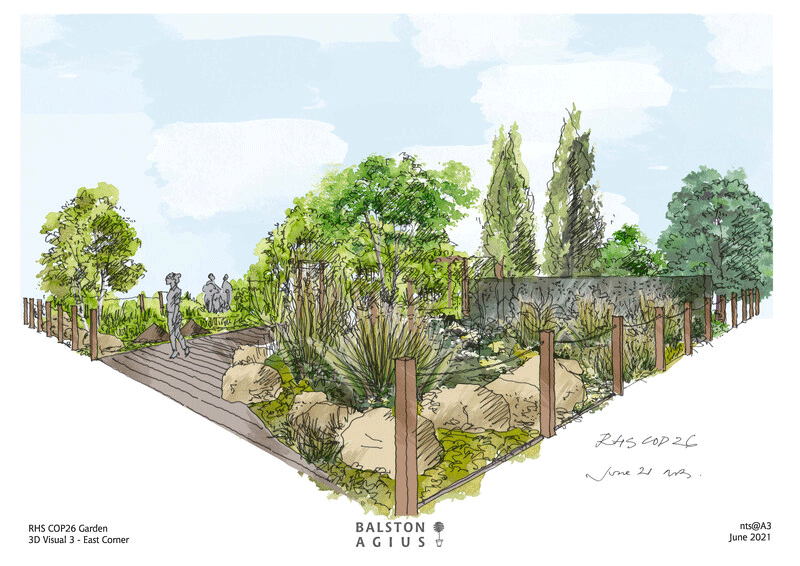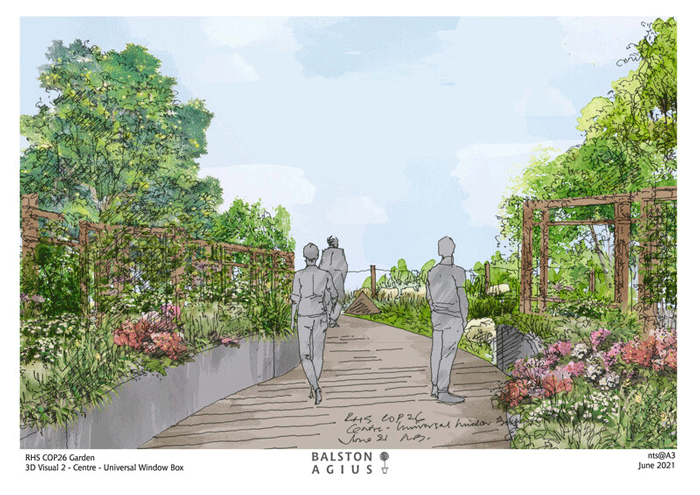RHS COP26 Garden at Chelsea
 One of the key features at the 2021 RHS Chelsea Flower Show (21st to 26th September) is the RHS COP26 Garden designed by Balston Agius, led by Marie-Louise Agius.
One of the key features at the 2021 RHS Chelsea Flower Show (21st to 26th September) is the RHS COP26 Garden designed by Balston Agius, led by Marie-Louise Agius.
With the UK hosting the 26th UN Climate Change Conference of the Parties (COP26) in Glasgow in November 2021, the garden is aptly timed and will demonstrate how our gardens, plants and public green spaces can play an integral part in protecting biodiversity, our planet and people and ensure a greener, more resilient future for us all.
This important garden is set to be a real game changer to get government, press and people everywhere to understand and appreciate how everyone growing more plants responsibly and creating nature based solutions in their outside spaces, can help protect the planet.
The garden comprises four key themes – Decline, Adaptation, Mitigation and Balance.
In the Decline quarter of the garden, the key issues around climate change will be demonstrated such as poorly managed planning and construction. It will show negative gardening practices and the sterility of the paved-over front garden.
The Adaptation quarter will show how we need to be more environmentally aware and adjust our landscaping and planting to respond to climate change. For example, using highly drought tolerant desert plants which can also put up with occasional deluges and adjusting ground levels to promote faster drainage.
Mitigation will demonstrate landscaping and planting ideas both at a community level and a more personal garden level. The fundamentals of soil, control of surface water run-off and composting will be covered. There is a wildlife pond and a meadow and the RHS hope that visitors will be inspired to take some of these ideas home.
In the Balance area of the Garden the design shows how we can work with nature, even when temperatures have risen and storms are more severe. This is a modern cottage garden area, a green outside space with a diverse range of plants reflecting growing conditions.
There is a sinuous path surfaced with recycled scaffold boards leading through the garden, pausing at the UNIVERSAL WINDOW BOX. The intention here is to demonstrate a mini-mitigation with a variety of climbers, annuals and small shrubs, which anyone could plant in their garden or window box.
 Alistair Griffiths, RHS Director of Science, says: “The RHS is passionate about the significant improvements our gardens can make to reverse the biodiversity climate crisis and we are conducting scientific research to find and share the best solutions to help adapt to, and mitigate against, climate change by looking after our habitat, the planet.
Alistair Griffiths, RHS Director of Science, says: “The RHS is passionate about the significant improvements our gardens can make to reverse the biodiversity climate crisis and we are conducting scientific research to find and share the best solutions to help adapt to, and mitigate against, climate change by looking after our habitat, the planet.
“The RHS COP26 Garden is an incredible display showing how we can both harm our planet through gardens but also, more importantly, how, through our outside spaces we can, through nature based solutions, proactively do good to help biodiversity, the environment and protect the planet, something that is absolutely vital in this climate crisis and our survival. Never has it been so important to shine a light on these critical issues.”
Marie-Louise Agius of Balston Agius said they were honoured to be asked by the RHS to design the garden: “Climate change is something we face on a daily basis and it cannot be ignored,” she said. “Moreover we need to be proactive about addressing the issues and we hope to show the role horticulture and a sustainable approach to the design of our external spaces can have in doing this. This is not an issue for ‘others’ to deal with, we each have an individual responsibility and opportunity to contribute towards improving climate change.”
Photo credit: Banner and centre image ©RHS, credit Balston Agius

